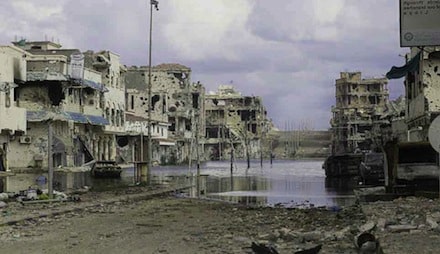
Though the British press have chosen to ignore it, a recent report in the Washington Times newspaper is the latest nail in the coffin that is the mainstream narrative of the 2011 NATO intervention in Libya.
An intervention, perhaps not coincidentally, which received the support of the vast majority of the British newspapers and 557 wise MPs, with just 13 opposed.
The mainstream narrative runs something like this. After the Tunisian-inspired protests erupted in February 2011, the Libyan Government forces responded with overwhelming, deadly violence, beating the rebels back to the eastern city of Benghazi. At this point NATO, authorised by the United Nations, set up a no-fly zone, supposedly to protect civilians in Benghazi.
Justifying the intervention, then US Secretary of State Hillary Clinton referred to Kosovo and the Rwandan genocide in an interview with ABC News. “Imagine we were sitting here and Benghazi had been overrun, a city of 700,000 people, and tens of thousands of people had been slaughtered, hundreds of thousands had fled”, she said. “The cries would be, ‘Why did the United States not do anything?’” Likewise, speaking to parliament a couple of days after the operation had begun, British Prime Minister David Cameron said NATO had helped to avoid a “bloody massacre” in Benghazi “in the nick of time”.
However, citing secret audio recordings between a an intermediary working for the US Joint Chiefs of Staff and the Libyan Government, the Washington Times suggests genocide was not imminent: “Defense intelligence officials could not corroborate those concerns and in fact assessed that Gadhafi was unlikely to risk world outrage by inflicting mass casualties”. The report goes onto quote the Executive Director of Human Rights Watch’s Middle East and North Africa division: “At that point, we did not see the imminence of massacres that would rise to genocide-like levels”.
This conclusion is supported by Alan J. Kuperman, Associate Professor of Public Affairs in the Lyndon B. Johnson School of Public Affairs at the University of Texas. “Qaddafi did not perpetrate a ‘bloodbath’ in any of the cities that his forces recaptured from rebels prior to NATO intervention… so there was virtually no risk of such an outcome if he had been permitted to recapture the last rebel stronghold of Benghazi”, Kuperman argued in a 2013 policy brief prepared for the world-renowned Belfer Center for Science and International Affairs at the Harvard Kennedy School.
At the time there were shocking stories about Libyan Government forces using mass rape as a weapon of war and Libyan aircraft bombing peaceful demonstrators. Amnesty International and Human Right Watch found no evidence for the former. Hugh Roberts, a former director of the International Crisis Group’s North Africa project, found the latter claim to be false too: “The story was untrue, just as the story that went round the world in August 1990 that Iraqi troops were slaughtering Kuwaiti babies by turning off their incubators was untrue and the claims in the sexed-up dossier on Saddam’s WMD were untrue.”
The Washington Times also highlights the various attempts made by the Libyan Government to push for a negotiated settlement. Early in the conflict the head of the US African Command attempted to negotiate a truce but was ordered to stand down by Clinton’s State Department. Again, this account chimes with many other reports that show NATO repeatedly ignored ceasefire proposals coming from the Libyan Government and the African Union. According to Roberts “London, Paris and Washington could not allow a ceasefire because it would have involved negotiations… and all this would have subverted the possibility of the kind of regime change that interested the Western powers.”
Today, Libya is a chaotic mess. In November 2014 Amnesty International warned “lawless militias and armed groups on all sides of the conflict in western Libya are carrying out rampant human rights abuses, including war crimes.” The same month the UN Refugee Agency reported that nearly 400,000 Libyans had been displaced by the on-going violence, whilst the Associated Press noted the Libyan city of Darna had become the first city outside of Syria and Iraq to pledge allegiance to the Islamic State.
Misinformation and propaganda used as a pretext for war. A war that plays a significant role in destroying an oil-rich nation in the Middle East. Sound familiar? Like Iraq, we should demand a public inquiry into the UK’s involvement in this duplicitous aggression. At the very least all those journalists who backed the intervention need to start asking the searching questions they should have asked back in 2011.
Reprinted with author’s permission from his website.

